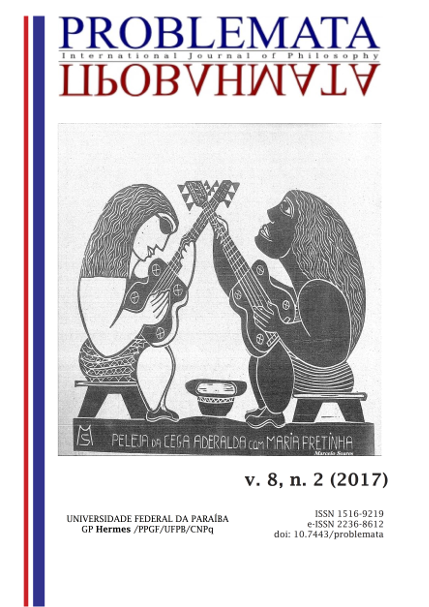O MATERIALISMO HISTÓRICO REVISADO. HABERMAS APÓS MARX
DOI:
https://doi.org/10.7443/problemata.v8i2.32453Keywords:
Cosmopolitismo, Kant, Habermas, Estado, Política.Abstract
Materialismo Histórico é revisado a partir de uma radicalização da interdisciplinaridade da Escola de Frankfurt. Habermas repensa o materialismo histórico a partir de uma leitura quase transcendental da linguagem e assim interpondo trabalho e interação como condições elementares no processo de socialização.
Downloads
References
ARAÚJO, Luiz Bernardo Leite. Religião e modernidade em Habermas. São Paulo: Loyola, 1996.
HABERMAS, Jürgen.. Teoria de la acción comunicativa I. Racionalidad de la accíon y racionalización social. Madrid: Taurus, 1987.
______. Teoría de la acción comunitativa: complementos y estudios previos. Madrid: Catedra, 1989.
______. Para a reconstrução do materialismo histórico. 2. ed. São Paulo: Brasiliense, 1990.
KESSELRING, Thomas. Jean Piaget: um diálogo in: Jürgen Habermas: 70 anos. Revista Tempo Brasileiro, n. 70, Julho-Setembro (1999): 75-88, particularmente o quadro apresentado na página 75.
McCARTHY, T. La teoría crítica de Jürgen Habermas, Madrid: Tecnos, 1992.
SOUZA, Jessé. Patologias da modernidade: um diálogo entre Habermas e Weber. São Paulo: Annablume, 1997.
Downloads
Additional Files
Published
Issue
Section
License
Authors who publish with this journal agree to the following terms:
- Authors retain copyright and grant the journal right of first publication with the work simultaneously licensed under a Creative Commons Attribution License that allows others to share the work with an acknowledgement of the work's authorship and initial publication in this journal.
- Authors are able to enter into separate, additional contractual arrangements for the non-exclusive distribution of the journal's published version of the work (e.g., post it to an institutional repository or publish it in a book), with an acknowledgement of its initial publication in this journal.
-
- Authors are permitted and encouraged to post their work online (e.g., in institutional repositories or on their website) prior to and during the submission process, as it can lead to productive exchanges, as well as earlier and greater citation of published work (See The Effect of Open Access).





